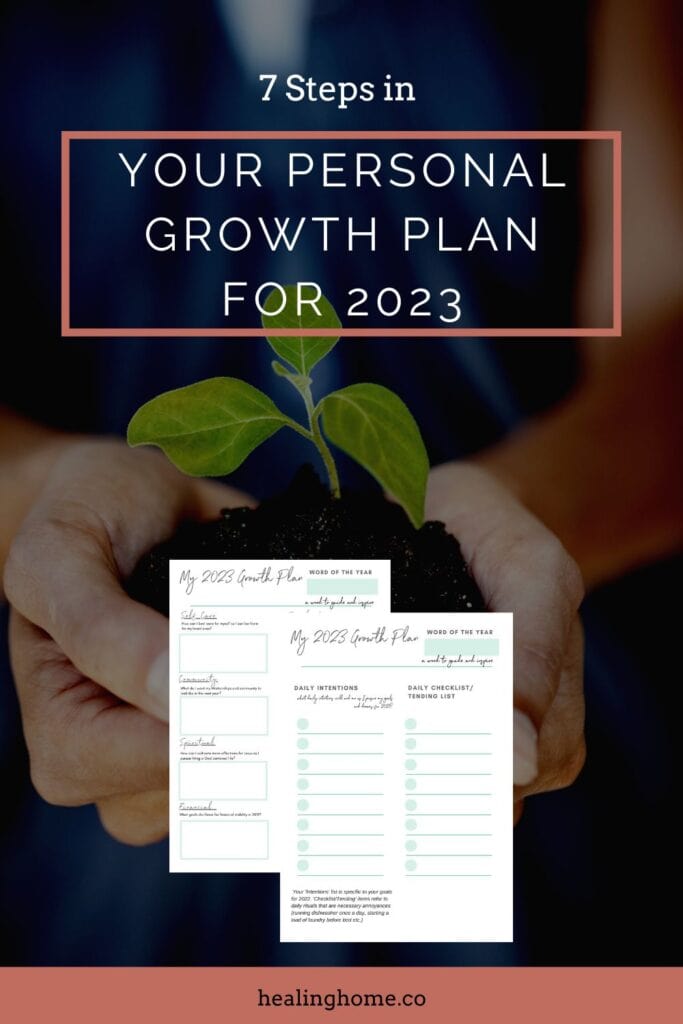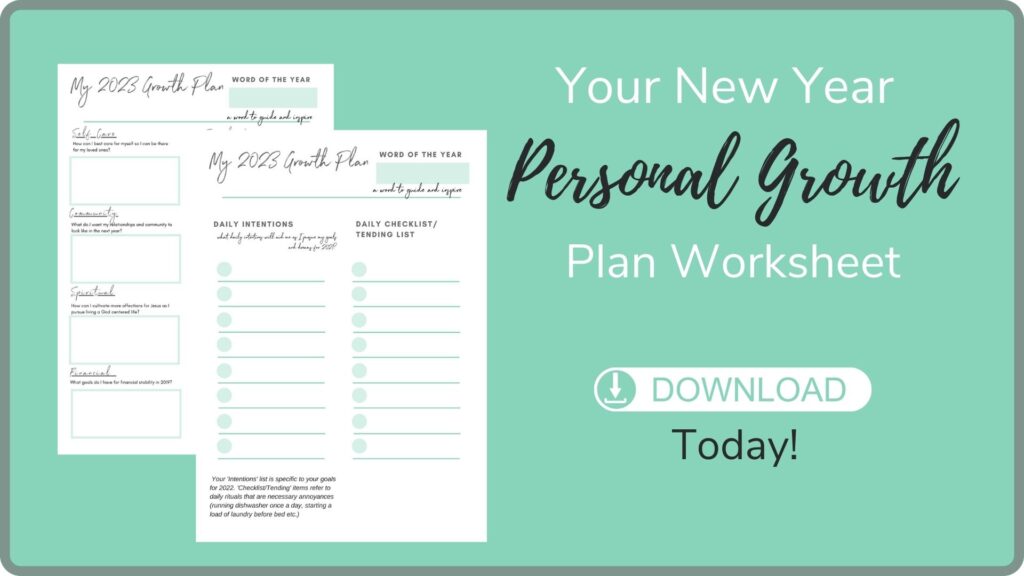A personal growth plan is an action-packed look at personal development for the upcoming year. Traditionally there are 5 parts of personal development: mental, social, spiritual, emotional, and physical. Constructing a personal growth plan takes intention as you reflect on years past and prayerfully consider the year coming.
Diving into a personal growth plan in light of the Gospel is a different beast entirely! Especially when we evaluate our goals and intentions in light of Colossians 3.

This page may contain affiliate links. To view my full affiliate link disclosure, click here. There are Amazon affiliate links in this post. As an Amazon Associate, I make a small commission from Amazon links in this post. Find our privacy policy, terms of service, and more information about user data by visiting the links above.
Planning your Year for Success
It’s time to kick the past to the curb and plan for the upcoming year!
2020 was a strange year wasn’t it? I still look back at 2020 when I’m planning my years. If I could get I have an observation, those that planned their year, still had a successful year. It might have looked different than what they originally anticipated, but having a plan allows us to pivot (a Friends episode just came to mind!) when things don’t quite go as planned.
I am constantly encountering successful people that are intentional about goal planning and casting vision over their years. When we cast vision and pursue that vision we will see results.
A few years ago I dived into the book The Lifegiving Home: Creating a Place of Belonging and Becoming by Sally Clarkson and found that she spends an entire day away from the house planning out her year.
When she had kids at home, her husband would intentionally send her out and take care of the kids while she hunkered down in a hotel lobby to think and organize and cast vision. I find that not only remarkable but inspiring.
What are the 5 Areas of Personal Development?
Imagine the intent you could add to your year by taking a day to plan and organize your goals for 2023! Not everyone can do that, I couldn’t even imagine doing that with 2 small children, just getting my morning planned can sometimes be overwhelming! But it’s inspiring to think of the intention we can have. Let that inspiration and apply it to writing a personal growth plan.
When you write your personal growth plan, you are going to take the 5 areas of personal development and apply them to your goals and ambitions.
If you are struggling with personal growth/self-care in light of the Gospel, I encourage you to check out this article from Undoubted Grace. She addresses this exact issue from the perspective of scripture.
As we talk about personal development goals it’s important, we note the 5 areas of personal development that most people create plans around. Plans are typically constructed of mental, social, spiritual, emotional, and physical goals and steps for development.

The Selfishness of Personal Development and the Satisfaction of Jesus
I have spent most of my adult life disdaining New Year’s Resolutions. Not because they are not helpful, but because most New Year’s Resolutions are ways to better us, in which we think the ultimate outcome will satisfy us.
New Year’s Resolutions frustrate me because nothing that we can muster of our own accord will ultimately satisfy. Let’s be clear, Jesus is the only one that can truly satisfy. I know it can be a radical concept. But Jesus was radical. He laid out the truth and we can choose to accept or deny it. Finding our satisfaction in Christ is for our good and for God’s glory.
Jesus said to them, “I am the bread of life; whoever comes to me shall not hunger, and whoever believes in me shall never thirst.
John 3:35 ESV
For he satisfies the longing soul, and the hungry soul he fills with good things.
Psalm 107:9
How to Make a Personal Growth Plan
So where does that leave New Years Resolutions or a personal growth plan? Should we just crumple up our goals and intentions and throw them to the wind in pursuit of more God-centered living? I don’t think so.
Like so many other things, we can find balance in pursuing how God has created us and striving forward toward more self-sacrificing gospel-centered living.
I read this article earlier this year and found it useful in pursuing balance in setting goals and ambitions. The author uses Colossians 3 to list 8 ways of becoming more spiritually grounded in New Year’s Resolutions.
For the believer, these are a great foundation to consider when planning your intentions for the year. These types of personal growth will lead to eternal growth instead of momentary worldly growth (1 John 3:15-17).
- Live with Eternity in Mind
- Resolve to Kill sin
- Resolve to pursue holiness
- Resolve to be thankful
- Resolve to read and meditate on Scripture
- Resolve to commit to a local church
- Resolve to worship God through song
- Resolve to aim for the glory of Christ
With these spiritual resolutions in mind, I create goals, intentions, and pursuits that focus my year.
Over the years, I have used planners, journals, calendars, and plain pen and paper to write down and organize my thoughts for my upcoming year. Each year, I have discovered that setting resolutions ALWAYS fails for me. I cannot put my finger on the reason why, but resolutions are often too ‘big’ for me to undertake. It wasn’t until the last couple of years that discovered the terminology of yearly ‘intentions.’
How to Write a Personal Growth Plan
Most years I construct a personal growth plan that categorizes my goals in to smaller sections. You can do this too by downloading the 2023 “Growth Plan” outline. There is also a spot in this outline for a Word of the Year choice.
It’s the perfect size to place in a permanent place to center your goals and ambitions for 2023. Not every year looks the same, but here are some common categories I use:
- Health
- Spiritual
- Family
- Community/Relationships
- Career
- Passions
- Self Care
These cover the 5 areas of personal development (mental, social, spiritual, emotional, and physical), but also expand those areas into some more practical sections.

Other Planning Resources for 2023
I want to mention two other planning resources for 2023 that I love.
The first is called Powersheets.
Although the price tag may shock you at first, the outcome is phenomenal.
PowerSheets will walk you through what happened in 2021. What were your successes? What were your failures? It will walk you through your fears and your strengths. Finally, you will dive into the big-picture goals you want to strive for in 2022. Narrowing it down further into categories will help you make a very fine detailed personal growth plan.
What I like best about this type of planning is that it does not just stop with the goals set. One of the reasons New Years’ Resolutions fail is that there is no accountability. PowerSheetsadds monthly check-ins to keep on track and focused on what matters!
The other resource I want to mention is all that Undoubted Grace has for planning resources. Her journal and planners are worth looking at if you are a busy mom that needs some daily direction in planning and pursuing Jesus.
Are you ready to dive into 2023? Do you have goals and intentions? Let’s do this!

